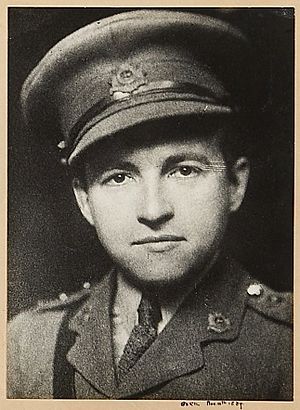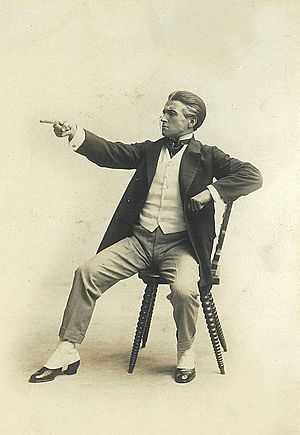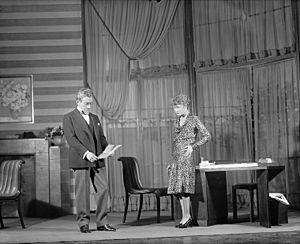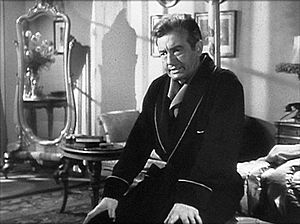Claude Rains facts for kids
Quick facts for kids
Claude Rains
|
|
|---|---|
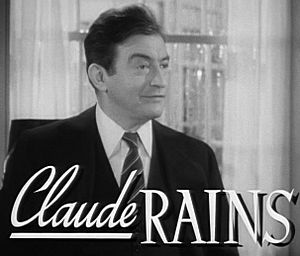
Trailer for Now, Voyager (1942)
|
|
| Born |
William Claude Rains
10 November 1889 |
| Died | 30 May 1967 (aged 77) Laconia, New Hampshire, U.S.
|
| Citizenship | United Kingdom - United States |
| Alma mater | Royal Academy of Dramatic Art |
| Occupation | Actor |
| Years active | 1900–1965 |
| Spouse(s) |
Isabel Jeans
(m. 1913; div. 1915)Marie Hemingway
(m. 1920; div. 1920)Beatrix Thomson
(m. 1924; div. 1935)Frances Propper
(m. 1935; div. 1956)Agi Jambor
(m. 1959; div. 1960)Rosemary Clark Schrode
(m. 1960; died 1964) |
| Children | 1 |
| Parent(s) |
|
William Claude Rains (born November 10, 1889 – died May 30, 1967) was a famous British actor. His acting career lasted for nearly 70 years! He was known for playing many different types of characters.
Claude Rains first appeared in an American movie as Dr. Jack Griffin in The Invisible Man (1933). He then starred in many other popular films. Some of these include The Adventures of Robin Hood (1938), Mr. Smith Goes to Washington (1939), and Casablanca (1942). He also appeared in Lawrence of Arabia (1962).
Claude Rains won a Tony Award for his stage acting. He was also nominated four times for an Academy Award for Best Supporting Actor. Many people thought he was one of the best "character stars" in movies. He was especially good at playing smart villains. Other famous actors, like Bette Davis and Peter O'Toole, admired his work.
Contents
Growing Up: Claude Rains' Early Life
William Claude Rains was born in Clapham, London, England, on November 10, 1889. His father, Fred Rains, was also an actor. Claude grew up in a poor part of London. He was one of twelve children, but sadly, many of his siblings died young. His mother took in boarders to help support the family.
When he was young, Claude had a strong Cockney accent and a speech impediment. He even called himself "Willie Wains" because of his stutter. He left school early to sell newspapers and help his family. He also sang in a church choir to earn a few extra pennies.
Because his father was an actor, young Claude spent a lot of time in theaters. He watched actors and learned how a theater worked. He made his first stage appearance at age ten in a play called Sweet Nell of Old Drury. He slowly worked his way up in the theater world. He started as a "call boy," telling actors when to go on stage. Later, he became a prompter, stage manager, and understudy. Eventually, he started getting bigger and better acting roles.
Becoming an Actor: Early Career and Military Service
In 1912, Claude Rains moved to America. He wanted to find more acting opportunities in New York. However, when World War I began in 1914, he returned to England. He joined the London Scottish Regiment. Other actors like Basil Rathbone and Ronald Colman served with him.
In 1916, Claude Rains was in a gas attack. This caused him to lose most of the sight in his right eye. It also damaged his vocal cords. He did not return to fighting. By the end of the war, he had become a captain.
After the war, Claude Rains kept working on his acting skills in England. Sir Herbert Beerbohm Tree, who started the Royal Academy of Dramatic Art, noticed his talent. Tree told Rains that to be a successful actor, he needed to get rid of his Cockney accent and stutter. Tree paid for Rains to have elocution lessons and books. Claude practiced every day and eventually changed his voice. His daughter said he became "a very elegant man, with a really extraordinary Mid-Atlantic accent." Soon, he was known as one of London's top stage actors.
Claude Rains also taught at the Royal Academy of Dramatic Arts (RADA). Famous actors like John Gielgud and Charles Laughton were some of his students.
Claude Rains' Film Career
Claude Rains became famous in London theater. He played the main role in Ulysses S. Grant. He also returned to New York City in 1927. There, he appeared in almost 20 Broadway plays.
Even though he had a small role in a silent film in 1920, Claude Rains started acting in movies later in his career. In 1932, he was offered a screen test for Universal Pictures. His unique voice was accidentally overheard from another room during a screen test. This led to him being cast as the main character in The Invisible Man (1933). This was the only movie his daughter remembers him ever watching. He didn't like watching the daily filming because he felt his face looked too big on the screen.
In 1935, Claude Rains signed a long contract with Warner Bros.. He played the bad guy, Prince John, in The Adventures of Robin Hood (1938). He later said that the film's director, Michael Curtiz, taught him how to act more subtly for the camera.
He was loaned to Columbia Pictures for Mr. Smith Goes to Washington (1939). In this movie, he played a dishonest U.S. senator. This role earned him his first Academy Award nomination. For Warner Bros., he played Dr. Alexander Tower in Kings Row (1942). He also played the clever police chief Captain Renault in Casablanca (1942). He was loaned out again to Universal to play the main character in Phantom of the Opera (1943).
Actress Bette Davis said Claude Rains was her favorite co-star. They acted together in four movies. Claude Rains became the first actor to earn a million dollars for a single movie role. This was for his part as Julius Caesar in Caesar and Cleopatra (1945). After that, he starred in Alfred Hitchcock's Notorious (1946). In this film, he played a former Nazi agent alongside Cary Grant and Ingrid Bergman.
In 1957, Claude Rains had his only singing and dancing role. It was in a TV musical version of The Pied Piper of Hamelin. This show was very popular.
Claude Rains continued to act in movies and TV shows in the 1950s and 1960s. He appeared in science fiction films like The Lost World (1960). Two of his last movie roles were as Dryden in Lawrence of Arabia (1962) and King Herod in The Greatest Story Ever Told (1965). This was his final film.
He also made several audio recordings. He narrated Bible stories for children and recited a poem called Enoch Arden.
Claude Rains' Personal Life and Later Years
Claude Rains became a naturalized citizen of the United States in 1939. He was married six times and had one child, a daughter named Jennifer (who is known as Jessica Rains).
In 1941, he bought a large farm in Pennsylvania. He loved being a "gentleman farmer" there. He enjoyed farming life with his family, plowing fields and growing vegetables. He even read books about farming between takes while filming movies. He sold the farm in 1956.
Claude Rains spent his last years in Sandwich, New Hampshire. He passed away on May 30, 1967, at the age of 77. He was buried in Red Hill Cemetery in Moultonborough, New Hampshire. He designed his own tombstone, which reads: "All things once, Are things forever, Soul, once living, lives forever."
In 2010, many of Claude Rains' personal items were sold at an auction. These included his 1951 Tony Award, old movie posters, letters, and photos. In 2011, the military uniform he wore as Captain Renault in Casablanca was also sold at an auction.
Filmography
| Year | Title | Role | Director | Other cast members | Notes |
|---|---|---|---|---|---|
| 1920 | Build Thy House | Clarkis | Fred Goodwins | Henry Ainley | First film role |
| 1933 | The Invisible Man | Dr. Jack Griffin/The Invisible Man | James Whale | Gloria Stuart, Henry Travers, Una O'Connor | |
| 1934 | Crime Without Passion | Lee Gentry | Ben Hecht, Charles MacArthur | Margo, Whitney Bourne | |
| The Man Who Reclaimed His Head | Paul Verin | Edward Ludwig | Lionel Atwill, Joan Bennett | ||
| 1935 | The Mystery of Edwin Drood | John Jasper | Stuart Walker | Douglass Montgomery, Heather Angel, David Manners | |
| The Clairvoyant | Maximus | Maurice Elvey | Fay Wray | ||
| The Last Outpost | John Stevenson | Louis Gasnier, Charles Barton | Cary Grant | ||
| Scrooge | Jacob Marley | Henry Edwards | Seymour Hicks, Donald Calthrop, Robert Cochran | Uncredited | |
| 1936 | Hearts Divided | Napoleon Bonaparte | Frank Borzage | Marion Davies, Dick Powell, Charlie Ruggles, Edward Everett Horton | |
| Anthony Adverse | Marquis Don Luis | Mervyn LeRoy | Fredric March, Olivia de Havilland, Gale Sondergaard | ||
| 1937 | Stolen Holiday | Stefan Orloff | Michael Curtiz | Kay Francis, Ian Hunter | |
| The Prince and the Pauper | Earl of Hertford | William Keighley | Errol Flynn, Billy and Bobby Mauch | ||
| They Won't Forget | Dist. Atty. Andrew J. "Andy" Griffin | Mervyn LeRoy | Gloria Dickson, Lana Turner | ||
| 1938 | White Banners | Paul Ward | Edmund Goulding | Fay Bainter, Jackie Cooper, Bonita Granville, Henry O'Neill, Kay Johnson | |
| Gold is Where You Find It | Colonel Christopher "Chris" Ferris | Michael Curtiz | George Brent, Olivia de Havilland, Tim Holt | Technicolor | |
| The Adventures of Robin Hood | Prince John | Michael Curtiz, William Keighley | Errol Flynn, Olivia de Havilland, Basil Rathbone | Technicolor | |
| Four Daughters | Adam Lemp | Michael Curtiz | Rosemary, Lola, and Priscilla Lane, Gale Page, John Garfield | ||
| 1939 | They Made Me a Criminal | Det. Monty Phelan | Busby Berkeley | John Garfield, Gloria Dickson, May Robson | |
| Juarez | Emperor Louis Napoleon III | William Dieterle | Paul Muni, Bette Davis, Brian Aherne, John Garfield | ||
| Sons of Liberty | Haym Salomon | Michael Curtiz | Gale Sondergaard | Technicolor; two-reel short | |
| Daughters Courageous | Jim Masters | Michael Curtiz | Rosemary, Lola, and Priscilla Lane, Gale Page, John Garfield | ||
| Mr. Smith Goes to Washington | Sen. Joseph Harrison Paine | Frank Capra | Jean Arthur, James Stewart, Thomas Mitchell | Nomination—Academy Award for Best Supporting Actor | |
| Four Wives | Adam Lemp | Michael Curtiz | Eddie Albert, Rosemary, Lola, and Priscilla Lane, Gale Page, John Garfield | ||
| 1940 | Saturday's Children | Mr. Henry Halevy | Vincent Sherman | John Garfield, Anne Shirley | |
| The Sea Hawk | Don José Álvarez de Córdoba | Michael Curtiz | Errol Flynn, Brenda Marshall, Henry Daniell, Flora Robson, Alan Hale | Sepia tone (sequence) | |
| Lady with Red Hair | David Belasco | Curtis Bernhardt | Miriam Hopkins, Laura Hope Crews | ||
| 1941 | Four Mothers | Adam Lemp | William Keighley | Rosemary, Lola, and Priscilla Lane, Gale Page | |
| Here Comes Mr. Jordan | Mr. Jordan | Alexander Hall | Robert Montgomery, Evelyn Keyes, Edward Everett Horton | ||
| The Wolf Man | Sir. John Talbot | George Waggner | Lon Chaney, Jr., Evelyn Ankers, Patric Knowles, Ralph Bellamy, Warren William, Bela Lugosi, Maria Ouspenskaya | ||
| 1942 | Kings Row | Dr. Alexander Tower | Sam Wood | Ann Sheridan, Robert Cummings, Ronald Reagan, Betty Field, Charles Coburn | |
| Moontide | Nutsy | Archie Mayo | Jean Gabin, Ida Lupino, Thomas Mitchell | ||
| Now, Voyager | Dr. Jaquith | Irving Rapper | Bette Davis, Paul Henreid, Gladys Cooper | ||
| Casablanca | Capt. Louis Renault | Michael Curtiz | Humphrey Bogart, Ingrid Bergman, Paul Henreid, Conrad Veidt, S.Z. Sakall, Sydney Greenstreet, Peter Lorre, Dooley Wilson | Nomination—Academy Award for Best Supporting Actor | |
| 1943 | Forever and a Day | Ambrose Pomfret | Herbert Wilcox (sequence with Rains) |
Anna Neagle, Ray Milland, C. Aubrey Smith | |
| Phantom of the Opera | Erique Claudin/The Phantom of the Opera | Arthur Lubin | Nelson Eddy, Susanna Foster | Technicolor | |
| 1944 | Passage to Marseille | Captain Freycinet | Michael Curtiz | Humphrey Bogart, Michèle Morgan, Philip Dorn, Sydney Greenstreet, Peter Lorre, Helmut Dantine | |
| Mr. Skeffington | Job Skeffington | Vincent Sherman | Bette Davis, Walter Abel, George Coulouris, Richard Waring | Nomination—Academy Award for Best Supporting Actor | |
| 1945 | Strange Holiday | John Stevenson | Arch Oboler | Barbara Bate, Martin Kosieck, | |
| This Love of Ours | Joseph Targel | William Dieterle | Merle Oberon | ||
| Caesar and Cleopatra | Julius Caesar | Gabriel Pascal | Vivien Leigh, Stewart Granger, Flora Robson | Technicolor | |
| 1946 | Notorious | Alexander Sebastian | Alfred Hitchcock | Cary Grant, Ingrid Bergman, Louis Calhern | Nomination—Academy Award for Best Supporting Actor |
| Angel on My Shoulder | Nick | Archie Mayo | Paul Muni, Anne Baxter | ||
| Deception | Alexander Hollenius | Irving Rapper | Bette Davis, Paul Henreid | ||
| 1947 | The Unsuspected | Victor Grandison | Michael Curtiz | Joan Caulfield, Audrey Totter, Constance Bennett, Hurd Hatfield | |
| 1949 | The Passionate Friends | Howard Justin | David Lean | Ann Todd, Trevor Howard | |
| Rope of Sand | Arthur "Fred" Martingale | William Dieterle | Burt Lancaster, Paul Henreid, Peter Lorre | ||
| Song of Surrender | Elisha Hunt | Mitchell Leisen | Wanda Hendrix, Macdonald Carey | ||
| 1950 | The White Tower | Paul DeLambre | Ted Tetzlaff | Glenn Ford, Alida Valli, Oskar Homolka, Cedric Hardwicke, Lloyd Bridges | Technicolor |
| Where Danger Lives | Frederick Lannington | John Farrow | Robert Mitchum, Faith Domergue, Maureen O'Sullivan | ||
| 1951 | Sealed Cargo | Captain Skalder | Alfred L. Werker | Dana Andrews, Lloyd Bridges | |
| 1952 | The Man Who Watched the Trains Go By | Kees Popinga | Harold French | Märta Torén, Marius Goring | Technicolor |
| 1956 | Lisbon | Aristides Mavros | Ray Milland | Ray Milland, Maureen O'Hara | Trucolor Naturama |
| 1957 | The Pied Piper of Hamelin | The Mayor of Hamelin | Bretaigne Windust | Van Johnson, Lori Nelson | Technicolor |
| 1959 | This Earth Is Mine | Philippe Rambeau | Henry King | Rock Hudson, Jean Simmons, Dorothy McGuire | Technicolor CinemaScope |
| Judgment at Nuremberg | Judge Haywood | George Roy Hill | Maximillian Schell, Paul Lukas, Melvyn Douglas | Playhouse 90 | |
| 1960 | The Lost World | Professor George Edward Challenger | Irwin Allen | Michael Rennie, Jill St. John, David Hedison, Fernando Lamas, Richard Haydn | Deluxe color CinemaScope |
| 1961 | Battle of the Worlds | Professor Benson | Antonio Margheriti | Bill Carter | Colour |
| 1962 | Lawrence of Arabia | Mr. Dryden | David Lean | Peter O'Toole, Alec Guinness, Jack Hawkins, Omar Sharif, Anthony Quinn, Anthony Quayle, Arthur Kennedy, José Ferrer | Technicolor Super Panavision 70 |
| 1963 | Twilight of Honor | Art Harper | Boris Sagal | Richard Chamberlain, Nick Adams, Joey Heatherton, Linda Evans | |
| 1965 | The Greatest Story Ever Told | Herod the Great | George Stevens | Max von Sydow, plus many cameos | Final film |
Awards and Nominations
| Year | Category | Nominated work | Result |
|---|---|---|---|
| 1939 | Best Supporting Actor | Mr. Smith Goes to Washington | Nominated |
| 1943 | Casablanca | Nominated | |
| 1944 | Mr. Skeffington | Nominated | |
| 1946 | Notorious | Nominated |
| Year | Category | Nominated work | Result |
|---|---|---|---|
| 1951 | Best Actor in a Play | Darkness at Noon | Won |
| Year | Category | Nominated work | Result |
|---|---|---|---|
| 1951 | Distinguished Performance | Darkness at Noon | Won |
| Year | Category | Nominated work | Result |
|---|---|---|---|
| 1963 | Best Spoken Word Album | Enoch Arden | Nominated |
See also
 In Spanish: Claude Rains para niños
In Spanish: Claude Rains para niños
 | Madam C. J. Walker |
 | Janet Emerson Bashen |
 | Annie Turnbo Malone |
 | Maggie L. Walker |


